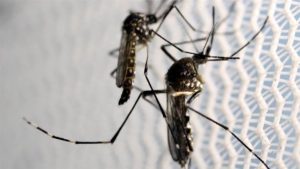Unlike Northern parts of the U.S., South Florida, including The Florida Keys, has just two seasons. The dry season which begins in November and runs into May. The rainy season which occurs from May through October. While there are Mosquitoes in the Florida Keys year around, they usually are reduced during the dry season due to the reduction standing water for breeding. The rainy season is also the mosquito season and brings back the frequent rain puddles and other locations of standing water which the mosquitos breed in.
I’m sure you have heard about the possible diseases carried by mosquitoes.
The following, based on information from the Florida Department of Health in Monroe County, the Centers for Disease Control and Prevention and Florida Keys Mosquito Control District, is provided to address any questions:
 Mosquito-borne illnesses such as dengue, chikungunya and Zika are viral diseases primarily transmitted by the Aedes aegypti mosquito, an introduced freshwater species common to the southeastern United States, the Bahamas, Caribbean, Central and South America as well as other tropical and subtropical locations. These diseases are not normally spread person-to-person. The U.S. Centers for Disease Control and Prevention advise that Zika is normally transmitted by the bite of an infected Aedes aegypti mosquito, although sexual transmission is also possible.
Mosquito-borne illnesses such as dengue, chikungunya and Zika are viral diseases primarily transmitted by the Aedes aegypti mosquito, an introduced freshwater species common to the southeastern United States, the Bahamas, Caribbean, Central and South America as well as other tropical and subtropical locations. These diseases are not normally spread person-to-person. The U.S. Centers for Disease Control and Prevention advise that Zika is normally transmitted by the bite of an infected Aedes aegypti mosquito, although sexual transmission is also possible.
To help avoid being bitten by Aedes aegypti or other mosquito species, health and mosquito control officials advise using mosquito repellents that contain 20 to 30 percent DEET, picaridin or oil of lemon eucalyptus (see how you can make your own below). DEET is not recommended for use on children younger than 2 months old. Wearing permethrin-treated long-sleeved shirts and pants, when comfortable to do so, provides additional protection. When inside, close windows and use air conditioning. Or, if windows are open, check screens to ensure there are no holes.
The Florida Keys Mosquito Control District has an aggressive mosquito suppression and abatement program, with an annual operating budget of around $11 million. New technologies used include aerial application of an innovative larvicide that targets the mosquito larvae and stops them from reaching adulthood. The larvicide is non-toxic to humans and animals.
People are advised to eliminate standing water in yards and gardens, where mosquitoes like to breed, in containers that can retain rainwater such as coolers, plant pot saucers, pet bowls, bird baths, kiddie pools, or buckets. Another place water tends to collect is between the leaves of bromeliad plants, which are popular in Florida Keys neighborhoods. The county recommends a safe larvicide for those plants. Those are sold at most hardware stores. Emptying and refilling at least every 2-3 days and water containers such as bird baths, kiddie pools, and plant pot saucers is important to break the breeding cycle.
Mosquito Bits, 30-Ounce – EcoSMART Organic Mosquito Control Tablets, Long Lasting Water Tablets, 12
can be used to treat the standing water you don’t want to dump such as rain barrels. You can also contact Monroe County Mosquito Control for more information and to ask for an inspector to visit your property and make recommendations on how to better control your problems. To place a service request, please call 305-292-7190.
Covering up with mosquito repellent or long sleeved clothing is another way to avoid getting bitten, along with making sure there are screens on doors and windows. Repel Lemon Eucalyptus Natural Insect Repellent, 4-Ounce Pump Spray is a safe and effective repellent using various plant oils that disrupt the mosquito ability to use scent to locate a blood source.
Here is a recipe to make your own mosquito repellent spray using Lemon Eucalyptus.
Lemon Eucalyptus Essential Oil 30%
Coconut Oil 30%
Witch Hazel 30% (you can substitute rubbing alcohol)
Vanilla Extract 2%
Citronella Essential Oil 2%
Rosemary Essential Oil 2%
Lavender Essential Oil 2%
Peppermint Essential Oil 2%
Mix all ingredients in a glass container, preferably with a spray top. Shake well prior to use and spray on exposed skin and rub it in.
Researchers at New Mexico State University tested 10 commercially available products for their effectiveness at repelling mosquitoes, and the results were published in the Journal of Insect Science. Based on the results of this study, a lemon-eucalyptus oil containing p-menthane-3,8-diol (PMD) [the active ingredient in Cutter Lemon Eucalyptus Insect Repellent] has similar efficacy to DEET repellents.”
Source: Researchers Compare “Natural” Repellents to DEET
Watch this Florida Keys Homeowners Guide from Florida Keys Mosquito Control
